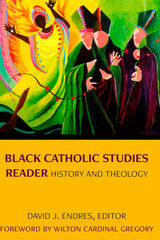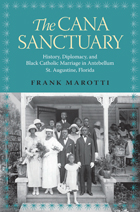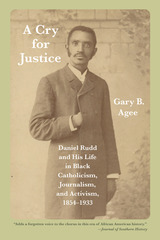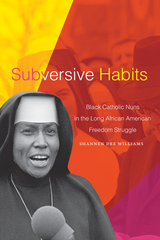4 books about African American Catholics

Black Catholic Studies Reader
History and Theology
David J. Endres
Catholic University of America Press, 2021
This first-ever Black Catholic Studies Reader offers an introduction to the theology and history of the Black Catholic experience from those who know it best: Black Catholic scholars, teachers, activists, and ministers. The reader offers a multi-faceted, interdisciplinary approach that illuminates what it means to be Black and Catholic in the United States.
This collection of essays from prominent scholars, both past and present, brings together contributions from theologians M. Shawn Copeland, Kim Harris, Diana Hayes, Bryan Massingale, and C. Vanessa White, and historians Cecilia Moore, Diane Batts Morrow, and Ronald Sharps, and selections from an earlier generation of thinkers and activists, including Thea Bowman, Cyprian Davis, and Clarence Rivers.
Contributions delve into the interlocking fields of history, spirituality, liturgy, and biography. Through their contributions, Black Catholic Studies scholars engage theologies of liberation and the reality of racism, the Black struggle for recognition within the Church, and the distinctiveness of African-inspired spirituality, prayer, and worship.
By considering their racial and religious identities, these select Black Catholic theologians and historians add their voices to the contemporary conversation surrounding culture, race, and religion in America, inviting engagement from students and teachers of the American experience, social commentators and advocates, and theologians and persons of faith.
[more]

The Cana Sanctuary
History, Diplomacy, and Black Catholic Marriage in Antebellum St. Augustine, Florida
Frank Marotti
University of Alabama Press, 2012
Uses the collective testimony from more than two hundred Patriot War claims, previously believed to have been destroyed, to offer insight into the lesser-known Patriot War of 1812 and to constitute an intellectual history of everyday people caught in the path of an expanding American empire
In the late seventeenth century a group of about a dozen escaped African slaves from the English colony of Carolina reached the Spanish settlement of St. Augustine. In a diplomatic bid for sanctuary, to avoid extradition and punishment, they requested the sacrament of Catholic baptism from the Spanish Catholic Church. Their negotiations brought about their baptism and with it their liberation. The Cana Sanctuary focuses on what author Frank Marotti terms “folk diplomacy”—political actions conducted by marginalized, non-state sectors of society—in this instance by formerly enslaved African Americans in antebellum East Florida. The book explores the unexpected transformations that occurred in seventeenth- and eighteenth-century St. Augustine as more and more ex-slaves arrived to find their previously disregarded civil rights upheld under sacred codes by an international, nongovernmental, authoritative organization.
With the Catholic Church acting as an equalizing, empowering force for escaped African slaves, the Spanish religious sanctuary policy became part of popular historical consciousness in East Florida. As such, it allowed for continual confrontations between the law of the Church and the law of the South. Tensions like these survived, ultimately lending themselves to an “Afro-Catholicism” sentiment that offered support for antislavery arguments.
In the late seventeenth century a group of about a dozen escaped African slaves from the English colony of Carolina reached the Spanish settlement of St. Augustine. In a diplomatic bid for sanctuary, to avoid extradition and punishment, they requested the sacrament of Catholic baptism from the Spanish Catholic Church. Their negotiations brought about their baptism and with it their liberation. The Cana Sanctuary focuses on what author Frank Marotti terms “folk diplomacy”—political actions conducted by marginalized, non-state sectors of society—in this instance by formerly enslaved African Americans in antebellum East Florida. The book explores the unexpected transformations that occurred in seventeenth- and eighteenth-century St. Augustine as more and more ex-slaves arrived to find their previously disregarded civil rights upheld under sacred codes by an international, nongovernmental, authoritative organization.
With the Catholic Church acting as an equalizing, empowering force for escaped African slaves, the Spanish religious sanctuary policy became part of popular historical consciousness in East Florida. As such, it allowed for continual confrontations between the law of the Church and the law of the South. Tensions like these survived, ultimately lending themselves to an “Afro-Catholicism” sentiment that offered support for antislavery arguments.
[more]

A Cry for Justice
Daniel Rudd and His Life in Black Catholicism, Journalism, and Activism, 1854-1933
Gary B. Agee
University of Arkansas Press, 2017
Daniel A. Rudd, born a slave in Bardstown, Kentucky, grew up to achieve much in the years following the Civil War. His Catholic faith, passion for activism, and talent for writing led him to increasingly influential positions in many places. One of his important early accomplishments was the publication of the American Catholic Tribune, which Rudd referred to as "the only Catholic journal owned and published by colored men." At its zenith, the Tribune, run out of Detroit and Cincinnati, where Rudd lived, had ten thousand subscribers, making it one of the most successful black newspapers in the country. Rudd was also active in the leadership of the Afro-American Press Association, and he was a founding member of the Catholic Press Association. By 1889, Rudd was one of the nation's best-known black Catholics. His work was endorsed by a number of high-ranking church officials in Europe as well as in the United States, and he was one of the founders of the Lay Catholic Congress movement. Later, his travels took him to Bolivar County, Mississippi, and eventually on to Forrest City, Arkansas, where he worked for the well-known black farmer and businessperson, Scott Bond, and eventually co-wrote Bond's biography.
[more]

Subversive Habits
Black Catholic Nuns in the Long African American Freedom Struggle
Shannen Dee Williams
Duke University Press, 2022
In Subversive Habits, Shannen Dee Williams provides the first full history of Black Catholic nuns in the United States, hailing them as the forgotten prophets of Catholicism and democracy. Drawing on oral histories and previously sealed Church records, Williams demonstrates how master narratives of women’s religious life and Catholic commitments to racial and gender justice fundamentally change when the lives and experiences of African American nuns are taken seriously. For Black Catholic women and girls, embracing the celibate religious state constituted a radical act of resistance to white supremacy and the sexual terrorism built into chattel slavery and segregation. Williams shows how Black sisters—such as Sister Mary Antona Ebo, who was the only Black member of the inaugural delegation of Catholic sisters to travel to Selma, Alabama, and join the Black voting rights marches of 1965—were pioneering religious leaders, educators, healthcare professionals, desegregation foot soldiers, Black Power activists, and womanist theologians. In the process, Williams calls attention to Catholic women’s religious life as a stronghold of white supremacy and racial segregation—and thus an important battleground in the long African American freedom struggle.
[more]
READERS
Browse our collection.
PUBLISHERS
See BiblioVault's publisher services.
STUDENT SERVICES
Files for college accessibility offices.
UChicago Accessibility Resources
home | accessibility | search | about | contact us
BiblioVault ® 2001 - 2024
The University of Chicago Press









